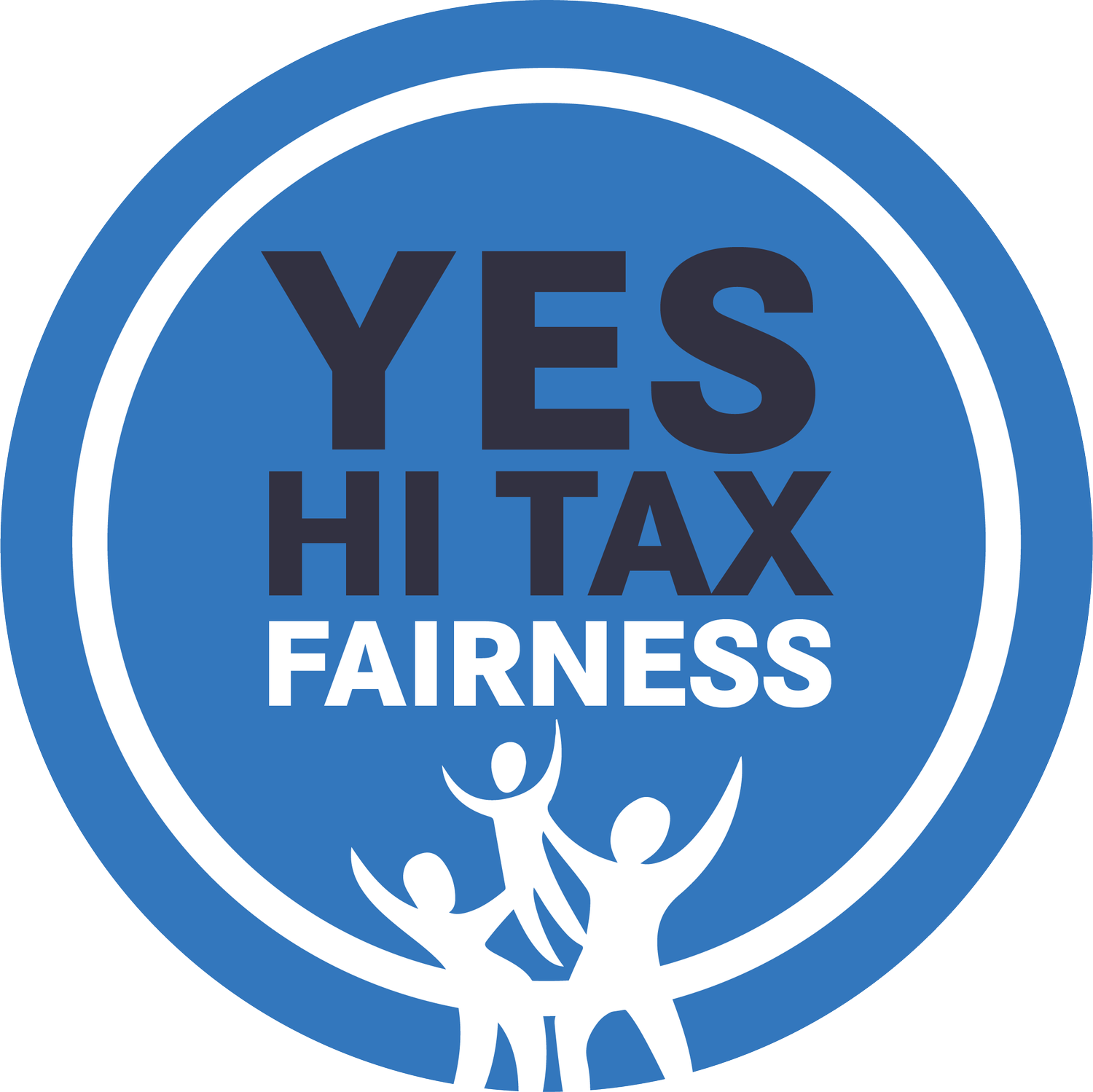Hawaiʻi organizations urge lawmakers to use tax fairness measures to avoid government cuts
Dear Hawaiʻi State Senators and Representatives,
As you and your colleagues tackle Hawaiʻi’s budget gap this legislative session, it is important to keep in mind that deep government spending cuts would have a devastating effect on our already injured economy, as well as hobble social services that are becoming more and more essential to working families during this pandemic crisis.
The International Monetary Fund has found that every dollar of reduced government spending results in as much as $1.50 in lost economic activity, while studies of past recessions have shown that state spending cuts exacerbate economic damage and slow recovery. Instead, our state government needs to increase its spending in order to keep Hawaiʻi’s economy going, as well as support our working families.
We, the 33 undersigned civic organizations, nonprofits, government agencies and service providers, call on you to support tax fairness measures to avoid program and service cuts, government worker furloughs, and layoffs. These tax fairness proposals are designed to target profitable corporations and wealthy individuals who can afford to pay a little more to keep Hawaiʻi going strong during this pandemic.
Utilizing these proposals will not only allow the state to plug its current budget gap, but will also ensure that state operations are more equitably-funded well into the future, creating greater economic opportunity for the working families of Hawaiʻi who will then be able to power our economy into a full recovery.
By enacting the following progressive revenue solutions, our state could collectively raise between $547.3 million and $969.6 million in additional revenue without slashing government spending:
Raise income taxes on the richest 2%. Hawaiʻi’s top 1% earn an average annual income of ~$1.3 million and received big tax cuts from Trump’s tax reform. If Hawaiʻi’s millionaires, the top 1% or 2%, were subject to higher personal income tax rates, that would raise between $12.6–$100.2 million in additional revenues per year.
Phase out low tax rates for those at the top. Hawaiʻi currently allows its wealthiest households to benefit from the lower tax brackets designed to benefit middle and lower-income residents. If Hawaiʻi made its tax systems more fair by gradually phasing out these lower rates for the very richest taxpayers, our state would raise $18.5–$153.9 million in additional revenues per year.
Tax investments the same way regular income is taxed. Hawaiʻi is one of only nine states that allows profits from the sale of stocks, bonds, investment real estate, and other “capital gains” to be taxed at a lower rate than ordinary income. Long-term capital gains make up 10% of total taxable income in the state. If those capital gains were taxed at regular individual income tax rates, it would yield about $80.2 million in new revenue annually.
Raise taxes on wealthy inheritances. Among the states that have estate taxes, Hawaiʻi has the fourth-highest exemption amount, allowing estates valued up to $5.5 million to go to heirs without taxes. If Hawaiʻi’s estate tax exemption were dropped to between $1 million and $3.5 million, that would generate between $6.6–$18.3 million in additional taxes per year.
Raise corporate taxes. Trump’s tax reform cut the federal corporate income tax rate by 14%, while Hawaiʻi’s current top corporate tax rate of 6.4% is below the median of the states. The corporate tax is applied only to profits, so companies facing losses do not pay corporate income tax. If Hawaiʻi were to have a single tax rate on corporate profits of between 6.4 and 10%, it would raise an additional $2.9–$103 million in revenue per year.
Make global corporations pay taxes in Hawaiʻi. Large multinational corporations can shift profits to subsidiaries in offshore tax havens, or countries with minimal or no taxes, giving them an unfair advantage over small local competitors who must pay taxes in the U.S. By adopting “worldwide combined reporting” to help end offshore tax haven abuse, Hawaiʻi would collect an additional $38 million per year from these large multinational corporations.
Make Real Estate Investment Trusts (REITs) pay their fair share of taxes. REITs own $17 billion in Hawaiʻi real estate and earn about $1 billion in profits every year. Unlike individuals and corporations, REITs pay no taxes to the state on this income. Removing the tax loophole on REITs would raise about $30–$60 million in revenue each year.
Increase taxes on the sales of mansions. Between 2019 and September 2020, $8.4 billion dollars of homes were sold in Hawaiʻi, with multi-million dollar mansions usually sold to non-Hawaiʻi residents. Our current real estate conveyance tax rates are only 0.50–1.25% on mansions. If the conveyance tax were raised on properties valued at $2 million and above, that would raise $17–$71.5 million each year.
Tax sugary drinks. Consumption of sugary drinks contribute to Hawaiʻi’s unprecedented increases in obesity and chronic health conditions. A 2¢ per oz fee on sugar-sweetened beverages would raise $65.8 million for state public health programs while reducing consumption and disease risks.
Tax vaping and increase other tobacco taxes. About 25 other states have already imposed taxes on e-cigarette products. Establishing a tax on e-cigarette products could generate $8.2 million each year, while increasing the existing taxes on cigarettes would raise an additional $21.1–$24.1 million in state revenues.
Suspend some General Excise Tax (GET) exemptions. The state tax code allows many kinds of businesses to reduce their tax liability through exemptions or credits. In 2011, to address the economic crisis of the last recession, the state legislature temporarily removed 31 special exemptions from paying the GET for two years. A similar suspension now could add $254.6 million in tax revenues.
We acknowledge the difficult decisions surrounding our state budget, but believe there are several progressive tax solutions that should be considered before program and service cuts, government worker furloughs, and layoffs. We urge you to prioritize these tax fairness proposals during the 2021 legislative session to generate hundreds of millions in badly-needed revenue, avoid damaging cuts, and restore Hawaiʻi’s economy to full strength as quickly as possible. Mahalo for your leadership and service to Hawaiʻi during these challenging times.
Sincerely,
AF3IRM Hawaiʻi
Americans for Democratic Action
Breastfeeding Hawaiʻi
Community Alliance on Prisons
Democratic Party of Hawaiʻi Education Caucus
Democratic Party of Hawaiʻi
Faith Action for Community Equity
Hawaiʻi Alliance for Community-Based Economic Development
Hawaiʻi Children's Action Network Speaks!
Hawaiʻi Public Health Institute
Hawaiʻi Alliance for Progressive Action
Hawaiʻi Appleseed Center for Law & Economic Justice
Hawaiʻi Health and Harm Reduction Center
Hawaiʻi Public Health Institute
Hawaiian Community Assets, Inc.
Healthy Mothers Healthy Babies Coalition of Hawaiʻi
HOPE Services Hawaiʻi
IHS, The institute for Human Services, Inc.
Imua Alliance
Kanu Hawaiʻi
LGBT Caucus of the Democratic Party of Hawaiʻi
Life of the Land
Living Wage Hawaiʻi
Maʻi Movement Hawaiʻi
Mental Health America of Hawaiʻi
Our Revolution Hawaiʻi
Partners In Care, Oʻahu’s Continuum of Care
PHOCUSED
Planned Parenthood Votes Northwest and Hawaiʻi
RYSE (Residential Youth Services & Empowerment)
Sierra Club of Hawaiʻi
Women's Caucus of the Democratic Party of Hawaiʻi
Young Progressives Demanding Action

